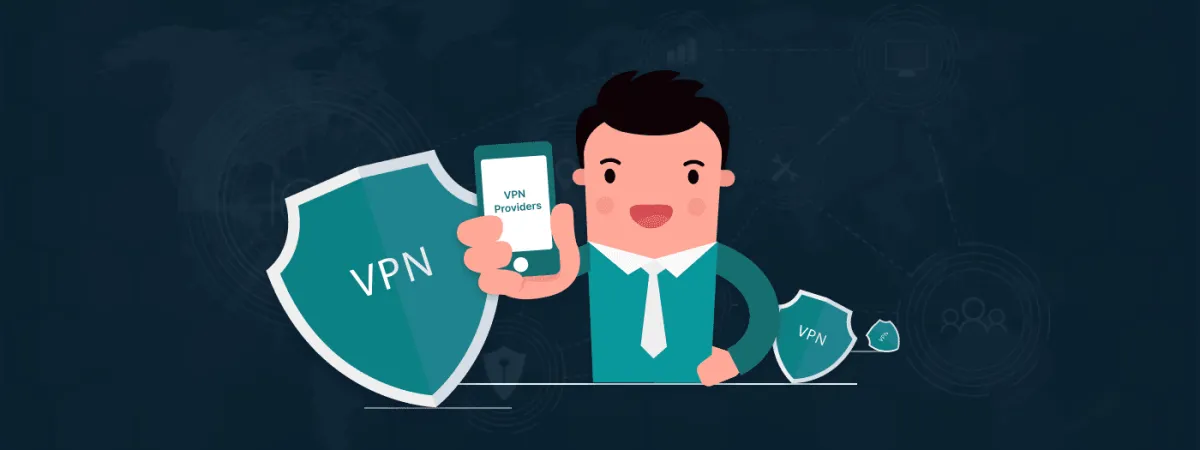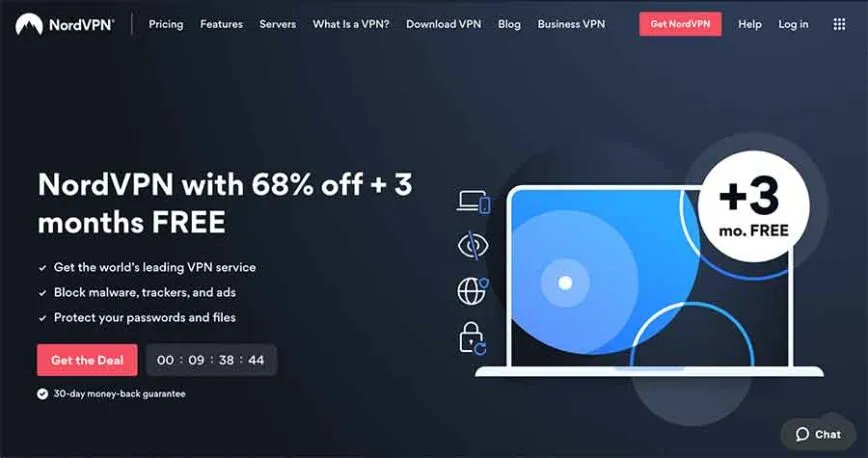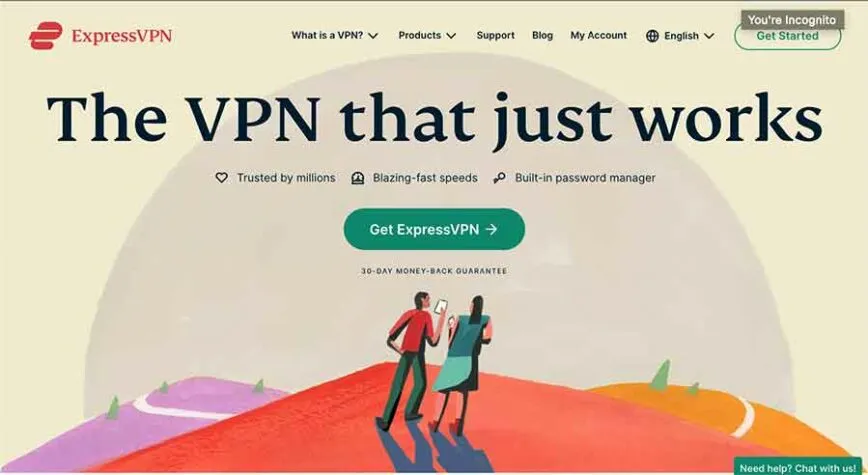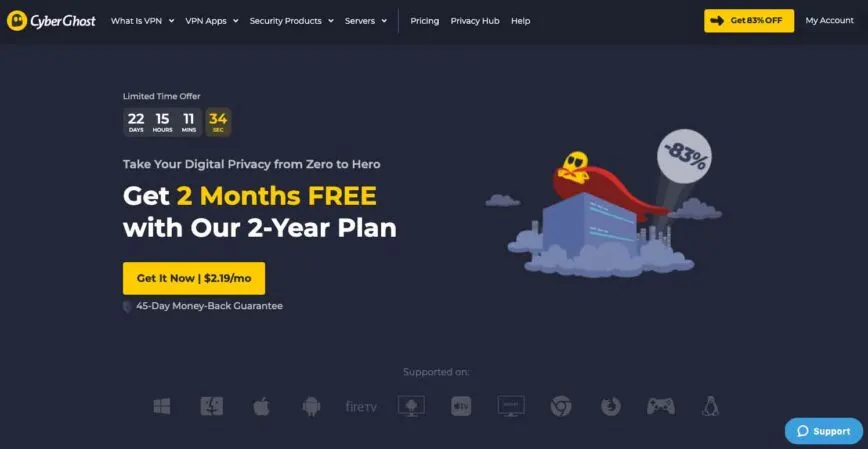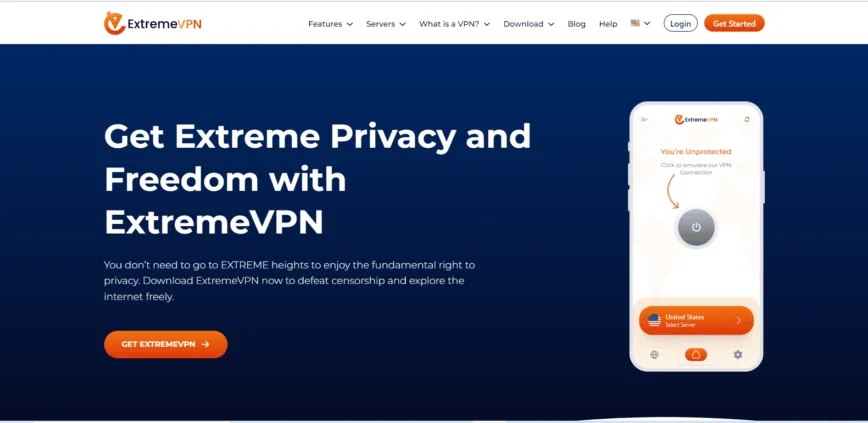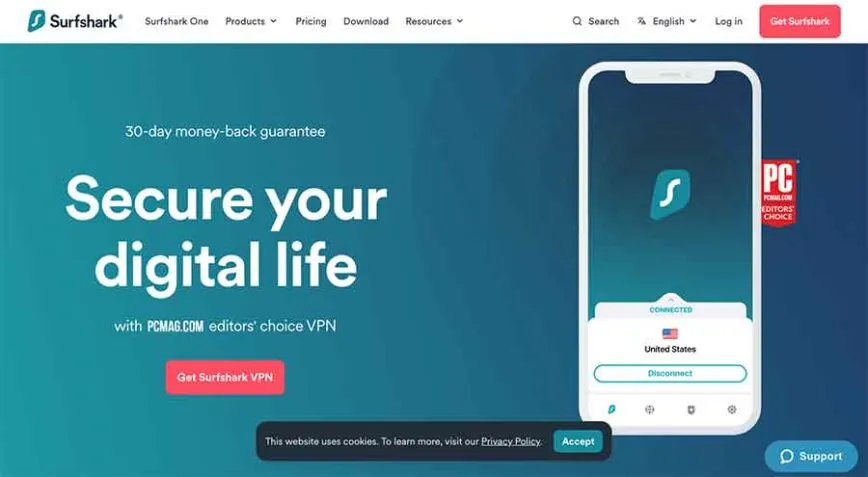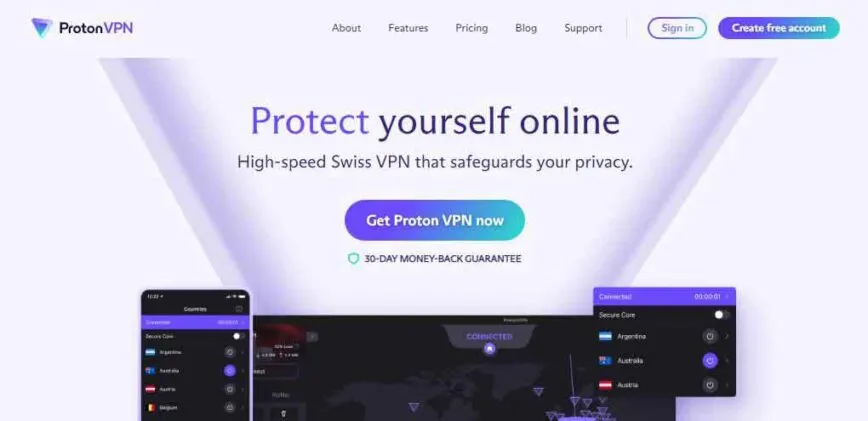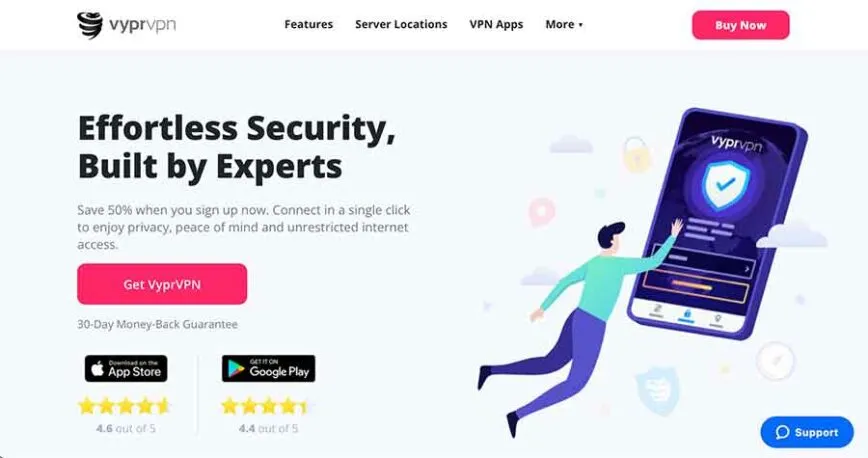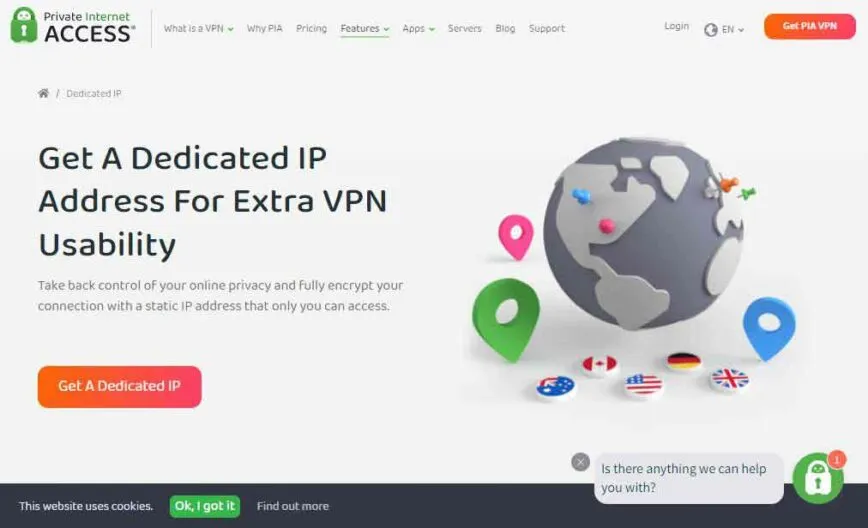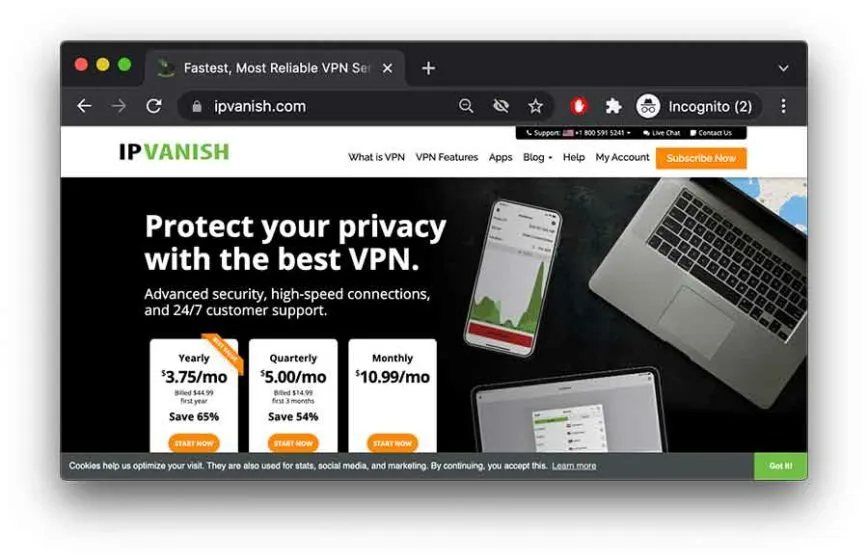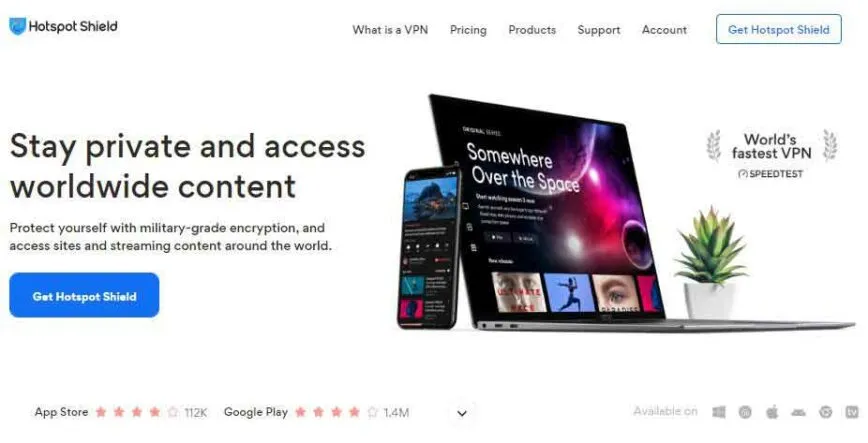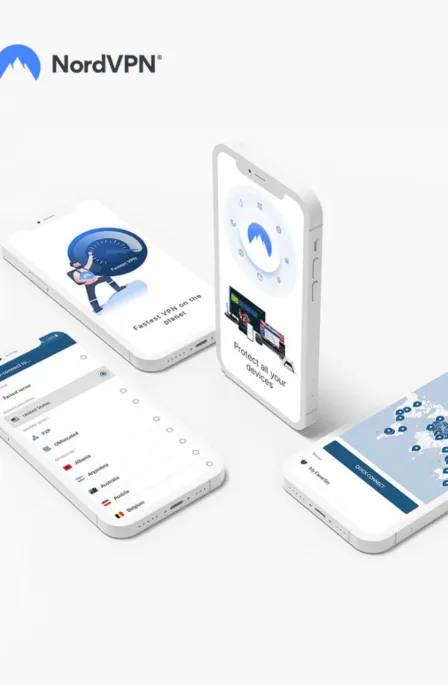People mostly use VPN services for privacy and security. Many VPN providers claim to provide 100% anonymity, security, and privacy online, but there are really few of them providing that. Here is the quick list of the most secure VPN provider we reviewed and tested.
- NordVPN – Uses state-of-the-art 256-bit AES encryption and the latestNordLynxand OpenVPN protocol.
- ExpressVPN – It is an excellent choice for anyone looking for privacy and security online.
- CyberGhost – The VPN provider uses secure AES-256-bit encryption and secure tunneling protocols.
- ExtremeVPN: A relatively new VPN with a large server network of more than 6,500 servers in more than 78 countries.
- Surfshark – it will offer AES-256 bit encryption, OpenVPN and WireGuard protocols with CleanWeb Malware Ad Blocker.
- Proton VPN – It is one of the most private VPN providers on the market.
- VyprVPN – It’s a little different from other VPN services because it protects your privacy in three slightly different ways.
- Private Internet Access (PIA): It is popular due to its customizable security options and large server network.
- IPVanish: A user-friendly VPN with a SugarSync cloud storage feature where you can securely store and access files of 500 GB.
- Hotspot Shield: Ensures fast and secure connections through its proprietary catapult Hydra tunneling protocol and encrypts your connection using the AES-128 encryption.
When choosing a VPN provider, security should be your top priority. After all, you’re entrusting your data to this company; you might want to look into how good they are at securing it! But which is the best, most secure VPN provider? While searching for the question, you might find several VPN providers claiming to be the most private VPN.
Amidst the massive number of VPNs available online, most VPN providers have shady log policies or share your data. They also lack essential security-enhancing features or use outdated encryption protocols with known security vulnerabilities. Therefore, this article is a compilation of some of the best tried and tested VPN providers—the most secure VPNs for you!
Why do you need a secure VPN?
- Security when working remotely: A VPN is essential for the company and remote employees. It encrypts all the traffic from the employee’s device to the company servers and vice versa, ensuring no one can intercept the company data.
- Bypass censorship and access geo-restricted content: A VPN allows you to spoof your location and access restricted content.
- Data privacy from your government and ISP: A VPN encrypts your connection, routes your traffic to a remote server, and masks your identity to prevent you from government and ISP surveillance.
- Data privacy from the services and apps you use: Some privacy-intrusive apps and websites store data about browsing habits, which is used to create tailored advertisements. A VPN can help you avoid such profiling.
- Security on public Wi-Fi: With a VPN, you don’t need to worry about connecting to unsecured or public Wi-Fi networks when traveling. The encryption premium VPNs provide ensures your connection is safe.
- Access blocked websites: If the network administrator in your school or workplace has blocked your favorite website, just use a VPN.
How do VPNs secure your data?
VPNs secure your data by encrypting it before it leaves your device. This prevents anyone from seeing your data or tracking your activity. VPNs also protect your privacy by hiding your IP address and location.
Most people use VPNs to keep their browsing secure and private, but they can also be used for streaming and downloading. Most importantly, by using a VPN, you maintain your right to freedom of expression and can access all the content you want.
Types of VPN services
There are four main types of VPN services;
- Site-to-site VPNs: These are used by multiple companies to create a combined single network. The users do not need to run additional software since the network connects.
- Mobile VPNs: They are used when an employee doesn’t have a stable or consistent internet connection. The users must install software on their devices or configure the operating system.
- Remote access VPNs: Organizations use this VPN to enable remote employees to connect to company servers safely. Users must install the software on their devices or configure the operating system before connecting to a private network.
- Personal VPNs: These are the most common types of VPNs used to create secure connections to the Internet and bypass restrictions and firewalls. Users install the VPN service’s software and connect to the Internet through a remote server.
The most secure VPN providers – Detailed list
While a short description of these VPNs is enough to give you a glimpse of their privacy and security, it is best to read these reviews to grasp their security better!
1. NordVPN
NordVPN, a Panama-based provider founded in 2008, is one of the best secure VPN providers. It is one of the few VPN providers that use state-of-the-art 256-bit AES encryption and the latest NordLynx and OpenVPN protocol. Moreover, it doesn’t leak your IP address and DNS requests and maintains higher levels of online security.
The VPN provider also has CyberSec, double VPN, and P2P-optimized servers. These specialized servers help in the safe torrent downloading process. Another impressive feature that NordVPN offers is the SmartPlay feature, which makes it a secure VPN that provides a fast and reliable streaming experience. With NordVPN, you can easily access blocked websites and content like Facebook, Netflix, and YouTube from anywhere.
Apart from this, NordVPN has a strict no-logs policy with a verified log audit report. Moreover, the obfuscated servers allow you to bypass censorship and even use the internet freely in countries with restrictive governments without sacrificing your digital privacy and security.
It has over 6,100 servers in 111 countries, so you can connect anywhere globally. You can use it on almost any device and operating system, including laptops, smartphones, tablets, and smart TVs, with just one app available for download for free. Also, it allows up to six simultaneous device connections and comes with a 30-day risk-free money-back guarantee offer.
2. ExpressVPN
ExpressVPN is one of the most popular and secure VPN providers. With its split tunneling, network lock, and Private DNS feature, ExpressVPN is an excellent choice for online privacy and security. Moreover, it is the first VPN with trusted server technology, making it the best among other VPN providers. All your data is stored on the RAM-only servers and deleted after each session.
The VPN provider uses 256-bit AES encryption to protect your data from prying eyes. It also offers support to both OpenVPN UDP and TCP protocols, respectively. You can choose any of them, and they can improve your user experience. Besides this, ExpressVPN uses the proprietary light way protocol that uses strong encryption ciphers and is best for boosting security and browsing speed.
It belongs to the safe jurisdiction of the British Virgin Islands and is among the VPN providers that follow a strict no-log policy. This means it is strictly against collecting users’ IP addresses and browsing data and guarantees that your online activities remain private.
It also has one of the best Netflix unblocking capabilities, making it an excellent choice for anyone who wants to stream Netflix and other streaming services easily. Finally, ExpressVPN offers both routers and custom VPN software. This means you can install ExpressVPN on all popular devices and operating systems like Android, iOS, MacOS, Linux, Windows, and routers and secure up to five multiple devices with a single subscription account.
3. CyberGhost
CyberGhost is a highly respected VPN provider thanks to its security features, ease of use, and wide range of compatibility. It has over 7,000 servers in 91 countries, making it an excellent choice for anyone looking for a VPN service with global coverage.
The VPN provider uses secure AES-256-bit encryption and tunneling protocols, i.e., OpenVPN and WireGuard protocols, to maintain your data security online. Also, it comes with a malware blocker that keeps you safe from malicious websites. Its specialized streaming, gaming, and torrenting servers make it an ideal choice for users who want to enjoy those activities without compromising privacy.
Moreover, it doesn’t store any of its users’ details on its servers, ensuring that your internet browsing data will be unavailable. To enhance your online security further, you can benefit from CyberGhost’s kill switch, dedicated IP address, and split tunneling features.
CyberGhost VPN is an excellent choice for accessing Netflix, Hulu, BBC iPlayer, and other streaming services from anywhere in the world. It is also compatible with Android, iOS, MacOS, and Windows platforms. With this VPN, you can enjoy up to seven multiple-device connections. It offers a free trial and a money-back guarantee, so decide which suits you best.
4. ExtremeVPN
ExtremeVPN is a relatively new VPN with reliable privacy and security features at an affordable price. The VPN has an extensive server network of over 6,500 servers in more than 78 countries, ensuring you can find a server near your location to improve connection speeds.
The provider uses military-grade AES-256 encryption to protect your data against interception while ensuring ultra-fast transmissions with its OpenVPN tunneling protocol. It does not store user data and has an automatic kill switch that disconnects your device from the internet if your VPN connection drops.
ExtremeVPN is supported by all major devices and operating systems, including Windows, iOS, Mac, Playstation, Chrome, and Android. On top of its low price, the service has a 30-day money-back guarantee, and you can test it risk-free.
The VPN has a DNS/IPv6 leak protection feature that protects your identity by preventing your IP address and DNS from leaking. Also, it has a split tunneling feature that allows you to choose which applications or websites can use the VPN service.
Additionally, the VPN supports up to 10 simultaneous connections to share the account with family and friends. The customer support team is superb, and they offer 24/7 live chat support to assist in case you have connection problems.
5. Surfshark
With over 3,200 servers in 65 countries, Surfshark can provide fast and reliable service to users. The VPN provider employs the latest encryption technology, such as AES-256-bit encryption. It also uses the OpenVPN and WireGuard protocols that hide your data from privacy invaders. If you are worried about malware or ads, Surfshark features a CleanWeb Malware Ad Blocker. It blocks out all malicious ads before they load and minimizes the risk of malware infecting your devices.
Most users are accustomed to using VPNs to access TV stations, but Surfshark takes it one step further with its IPTV service. Another unique aspect of Surfshark is its ‘Bypasser.’ Most VPN providers allow users to select which apps they want to use through their VPN, but Surfshark’s ‘Bypasser’ goes further and lets users select which apps bypass the VPN. This feature is pretty helpful during torrenting as well.
Moreover, it offers a ‘no-logs’ feature, a kill switch, and DNS Leak Protection. Most VPN providers are not allowed in China, but Surfshark is one of the few that can still offer its service. It provides a camouflage mode that pretends your traffic looks like regular internet traffic and helps bypass internet restrictions. Also, by enabling the no-borders mode, you can circumvent geographically imposed censorship and browse the web as you want.
Most VPN providers have a monthly or yearly subscription plan, but Surfshark allows users to pay for its service weekly. If you first want to test out Surfshark’s services, you can avail yourself of the free trial period or the 30-day money-back guarantee offer.
6. Proton VPN
Proton VPN is one of the most secure VPN providers on the market. It uses state-of-the-art security and AES-256-bit encryption, 4096-bit RSA key, and SHA 384 authentication, protecting your data from even the most advanced attackers. With 6,700+ servers in over 100 countries, a strict no-logs policy, and a horde of security features, Proton VPN is an excellent choice for anyone who wants to protect their privacy.
One notably impressive feature of Proton VPN is the secure core. The feature is designed to protect users from network-based attacks and ensure protection by routing your traffic through multiple servers before leaving Proton VPN’s network, ensuring online privacy. Proton VPN has tactfully placed these remote secure core servers within Iceland and Switzerland, the countries known for their most robust privacy and data security laws.
In addition, Proton VPN does not store personally identifiable information on its servers. As an extra security measure, it deploys full-disk encryption on all its servers, protecting them from resourceful man-in-the-middle attacks.
It also offers built-in protection that detects security issues and disables unsecured connections, such as the “always-on” VPN kill switch to protect your data in case of a dropped connection. Moreover, it also offers an alternate routing technology feature that helps bypass censorship worldwide.
The VPN offers free and premium plans, but it’s always a great idea to use the premium version for security. The Plus plan allows you to connect up to ten devices and enjoy unlimited streaming and torrenting.
7. VyprVPN
VyprVPN is a reliable and secure VPN provider with more than 700 servers in Asia, Africa, America, and Europe. That means there are plenty of opportunities to find a server near where your internet traffic needs to go. It uses the industry’s highest AES-256 bit encryption and OpenVPN and WireGuard protocol.
Besides this, VyprVPN uses the Chameleon protocol that relies on solid ciphers and enables VyprVPN to bypass VPN blocks using obfuscation techniques. Most importantly, it is a verified no-log service and doesn’t log or share your browsing data with the government or any third party. It comes with essential security-boosting features like a kill switch, DNS protection, and the super-fast, safe (not available at Google Play) Chameleon protocol and NAT firewall.
That’s all great, but VyprVPN’s cloud security sets it apart. It’s a little different from other VPN services because it protects your privacy in three ways. Your encrypted internet traffic never touches the default DNS servers. Most ISPs use them, and they can result in third parties learning about your location and browsing habits. Vypr’s cloud lets you use its fast and safe DNS servers to browse the internet securely.
Furthermore, it also offers a business plan and helps organizations protect their sensitive data from competitors and threat actors. Secure your activities and data with VyprVPN now by availing of the 30-day money-back guarantee offer.
8. Private Internet Access (PIA)
Private Internet Access (PIA) is a reputable VPN that started in 2010. It is popular due to its customizable security options and extensive network of over 35,000 servers in 90 countries. The extensive server network ensures you can find a server near you to reduce latency and server overload cases.
It protects your privacy and security using AES-256 Encryption, DNS/IPv6 leak protection, OpenVPN protocol, and IP masking. It also maintains a strict no-logs policy and has applications for all major platforms and devices. PIA has a 30-day money-back guarantee, which makes it risk-free and allows unlimited simultaneous connections.
The VPN’s Wireguard transmission protocol ensures fast and reliable connection speeds, which boosts performance. In addition, it supports torrenting on all its servers and has an automatic kill switch that disconnects you from the internet if your VPN connection fails. PIA can unblock all major streaming platforms, and it has a split tunneling feature that allows you to choose the services that should always connect to the internet via a VPN.
9. IPVanish
IPVanish is a classic VPN that started in 2012 with only 32 servers. Currently, it has 2000+ servers in more than 75 locations, offering fast-speed connections and robust security features at an affordable price. It is registered in the USA, which is not a privacy-friendly country. However, despite its country of origin, it does not store identifying user data in its servers.
The VPN is user-friendly, and the installation process is simple. It supports various payment methods except for crypto. IPVanish comes with a 30-day money-back guarantee, so you can test their services risk-free. However, it does not work in China.
The service can unblock all major streaming platforms, including Netflix US and other services such as DAZN, ESPN, and HBO Max. It guarantees to offer consistent connections and the best streaming quality. Moreover, it has a SugarSync cloud storage feature where you can securely store and access up to 500 GB of files.
However, you have to pay more for this. Recently, the provider adjusted its policy to allow unlimited simultaneous connections. In addition, since it supports all major platforms, you can protect all your devices simultaneously. Also, the VPN supports unlimited P2P sharing, letting you torrent securely and privately. While your download speeds might drop when torrenting, you will not notice a significant change.
10. Hotspot Shield
Hotspot Shield is another secure VPN with over 3,200 servers in 70 countries. It is registered in the US, a country known for intrusive surveillance. Despite this, the provider has enforced a strict no-logs policy and has released transparency reports every year since 2017.
The VPN has excellent unblocking abilities, enabling you to bypass censorships, geo-restrictions, and blocked websites without detection. Also, it unblocks all the popular streaming services such as Netflix, Hulu, Amazon Prime, etc.
It ensures fast and secure connections through its proprietary catapult Hydra tunneling protocol and encrypts your connection using AES-128 encryption. The VPN app is compatible with all major devices, including macOS, Android, Windows, and iOS. Recently, it also added support for Android TV and routers.
Besides unblocking geo-blocked content, Hotspot Shield supports torrenting. You can seamlessly download and share torrent files with unlimited bandwidth and fast-speed servers. Although it only allows you to connect five simultaneous devices, you can install it on your router to add more connections.
Hotspot Shield offers a free version that has some limitations. For instance, it has a 500 Mb data cap that allows you to access only one server with slow speeds. The free version also has many ads and does not support Live Chat. However, it provides a generous 45-day money-back guarantee to let you try the paid services risk-free.
How we tested the most secure VPNs
A secure VPN must fulfill all the expectations of a safe and private network. We tested all the VPNs featured in this article based on the following aspects:
- Does it use RAM-only servers? The most secure servers should be RAM-only to ensure they do not permanently store user data.
- Does it leak? Leaking DNS and IP addresses can expose your true identity. To boost your privacy, a secure VPN should protect you against IPv6 and DNS leaks.
- Is the logs policy Independently audited? Secure VPN providers invite independent auditing bodies to verify whether they store user data. The VPN must be verified and certified by independent organizations that it enforces a strict no-logs policy.
- Do the privacy and security features work? Some VPNs claim to support many security features to attract customers. However, some of these features do not work and can expose you to online threats. Therefore, we verify that all the features of the VPNs are featured in this article.
- Does it bypass VPN blocks? Various governments and organizations have implemented sophisticated technologies to restrict access to content. A secure VPN should be able to bypass all restrictions and even help you access geo-restricted content without detection.
Are there free and secure VPNs?
Some quality free VPNs offer reliable services and meet the recommended industry standards. However, free VPNs have limited features and server networks, while others impose bandwidth limits and data caps. This can be frustrating, especially if your activities involve sensitive information in large files.
It is rare to find a free privacy-oriented VPN that doesn’t have limitations. Some of them collect user data and sell it to data brokers, while others use it to target you with personalized adverts. Others inject malware and trackers to monitor your browsing activities, which can have devastating consequences.
So, subscribe to a premium VPN service for a few bucks, or take advantage of the money-back guarantee to use a premium VPN for 30 days risk-free.
Are free VPNs safe?
Some free VPNs are good, but others do more harm than good. So, you should not blatantly trust entirely free VPNs because they can expose you to online threats. They also have many limitations regarding bandwidth, data caps, features, and performance. Below are some of the reasons why you should avoid free VPNs.
- Free VPNs use poor tunneling and encryption technologies that are insufficient to protect your privacy and security compared to premium services.
- Some free VPNs are owned by shady companies that collect your browsing data and sell it to data brokers.
- Some third parties have direct access to accessible VPN networks, and they can inject malware and ads or even hijack your web browser.
Which is the best VPN for privacy?
All the VPN providers mentioned above are the top-most secure VPN providers, but if you ask for one particular VPN that is best for privacy, go for NordVPN.
It uses AES-256-bit encryption and has secure core servers that utilize multiple servers in isolated locations to ensure your data can never be intercepted.
NordVPN also offers built-in protection that detects security issues and disables unsecured connections, identity theft protection, and an “always-on” VPN kill switch to protect your data in case of a dropped connection.
Tips to securely use a VPN
- Check for IPv6 and DNS leaks: Make a routine to check whether your VPN leaks your real IP or DNS. Sometimes, your provider may be experiencing downtime or being under maintenance, which could lead to such leakages.
- Use double VPN servers: Double VPN boosts your privacy and security by ensuring your data remains encrypted even if one server is compromised. You can also enable this feature manually if your provider does not support it by setting up another VPN connection on your router or browser extension.
- Enable auto-start and auto-connect features: These features ensure you can never connect to the internet without VPN protection. They ensure your device is connected to the VPN once it is powered on or when it detects an internet connection.
- Enable Kill switch: This feature protects you against leaks by disconnecting your device from the internet if your VPN connection drops. That way, no one can know your identity or monitor your online activities.
- Use your VPN’s DNS server: This is vital because it ensures that the VPN handles all your requests, and there are no chances of third parties tracking the URLs you visit.
- Enable the most secure tunneling protocol: Always confirm that the VPN uses the most secure protocol, such as WireGuard and OpenVPN.
- Use anonymous methods to sign up: Use crypto methods to pay and burn email addresses that malicious actors can use to track you.
How to check if your VPN is leaking?
A VPN is supposed to encrypt your traffic and hide your identity. However, a glitch may lead to a DNS or IP leak and expose your true identity to third parties. If this happens, other people can track and monitor your activities even when using a VPN.
It is essential to regularly check whether your VPN is leaking your DNS or IP address by following the steps below;
- Find your IP address: Disconnect from the VPN and use online tools such as whatsmyip to determine your IP address.
- Connect to the VPN and check the name of your VPN server and the IP address.
- On your browser, open DNSleaktest and check whether the information displayed matches your real data. If it does, your VPN is leaking.
To get full DNS status, click Extended Test to check whether the displayed servers belong to your ISP or your VPN provider if the servers do not belong to your VPN provider, your VPN leaks.
Can a VPN help me bypass government censorship?
Various governments restrict internet access for different reasons. However, a VPN is crucial to circumvent these restrictions and access your desired website or content. For instance, the Chinese authorities restrict many Western websites, such as Facebook and Twitter, but you can access them with a reliable VPN. In the UAE, people use VPNs to regain access to VoIP and make free calls.
A reliable and trustworthy VPN can help you bypass any kind of internet censorship or restriction imposed by a government. It allows you to spoof your location safely by rerouting your traffic to a remote server.
The VPN you use determines whether you can bypass the restrictions without detection. A VPN with poor encryption and limited features will likely leak your identity, preventing you from accessing restricted content.
Ensure your VPN has military-grade encryption, does not record your data, and has a kill switch that automatically disconnects your device from the internet if your VPN connection drops. Obfuscation is another important VPN feature to bypass government censorship, causing your VPN traffic to appear like regular HTTPS.
Share this article
About the Author
Rebecca James is an IT consultant with forward thinking approach toward developing IT infrastructures of SMEs. She writes to engage with individuals and raise awareness of digital security, privacy, and better IT infrastructure.
More from Rebecca JamesRelated Posts

6 Best VPNs for Amazon Prime in 2024 – Fast & Secure
KEY TAKEAWAYS Unblocking streaming content from Amazon Prime is easy only if you know the reliable V...

5 Best VPNs for Binance in 2024
KEY TAKEAWAYS Crypto trading has become so popular that many malicious actors are trying to scam cry...

7 Best Free VPNs for Torrenting in 2024 – [Safe and Tested]
KEY TAKEAWAYS Not everyone can afford premium VPN services on a tight budget. However, if you are go...

6 Best VPNs for Android TV in 2024
KEY TAKEAWAYS Most people like streaming content on Android TVs. However, Android TVs are also vulne...

6 Best Dark Web VPNs in 2024
KEY TAKEAWAYS After thorough research and reviewing various VPN providers, here’s a quick list...

6 Best VPNs for Popcorn Time – How to Stream Safely
KEY TAKEAWAYS Since the Popcorn Time app needs a P2P client, you need to use it with a VPN. Here is ...


